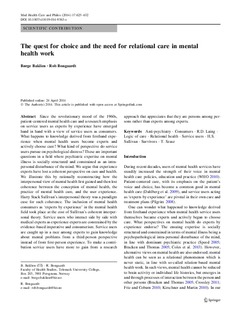| dc.contributor.author | Baklien, Børge | |
| dc.contributor.author | Bongaardt, Rob | |
| dc.date.accessioned | 2014-10-29T15:14:30Z | |
| dc.date.accessioned | 2017-04-19T12:44:33Z | |
| dc.date.available | 2014-10-29T15:14:30Z | |
| dc.date.available | 2017-04-19T12:44:33Z | |
| dc.date.issued | 2014-04-24 | |
| dc.identifier.citation | Baklien, B. & Bongaardt, R. The quest for choice and the need for relational care in mental health work. Medicine, Health Care and Philosophy. 2014, 17, p. 625-632 | |
| dc.identifier.issn | 1386-7423 | |
| dc.identifier.uri | http://hdl.handle.net/11250/2438307 | |
| dc.description.abstract | Since the revolutionary mood of the 1960s, patient-centered mental health care and a research emphasis on service users as experts by experience have emerged hand in hand with a view of service users as consumers. What happens to knowledge derived from firsthand experience when mental health users become experts and actively choose care? What kind of perspective do service users pursue on psychological distress? These are important questions in a field where psychiatric expertise on mental illness is socially structured and constrained as an intrapersonal disturbance of the mind. We argue that experience experts have lost a coherent perspective on care and health. We illustrate this by rationally reconstructing how the interpersonal view of mental health first gained and then lost coherence between the conception of mental health, the practice of mental health care, and the user experience. Harry Stack Sullivan’s interpersonal theory was a paradigm case for such coherence. The inclusion of mental health consumers as ‘experts by experience’ in the mental health field took place at the cost of Sullivan’s coherent interpersonal theory. Service users who interact side by side with medical experts as experience experts are constrained by the evidence-based imperative and consumerism. Service users are caught up in a race among experts to gain knowledge about mental problems from a third-person perspective instead of from first-person experience. To make a contribution service users have more to gain from a research approach that appreciates that they are persons among persons rather than experts among experts. | |
| dc.language.iso | eng | |
| dc.publisher | Springer | |
| dc.subject | anti-psychiatry | |
| dc.subject | consumers | |
| dc.subject | logic of care | |
| dc.subject | relational health | |
| dc.subject | service users | |
| dc.subject | survivors | |
| dc.title | The quest for choice and the need for relational care in mental health work | |
| dc.type | Journal article | |
| dc.type | Peer reviewed | |
| dc.date.updated | 2014-04-29T16:44:45Z | |
| dc.description.version | Published version | |
| dc.rights.holder | © Copyright The Author(s) 2014. | |
| dc.subject.nsi | 800 | |
| dc.identifier.doi | http://dx.doi.org/10.1007/s11019-014-9563-z | |
